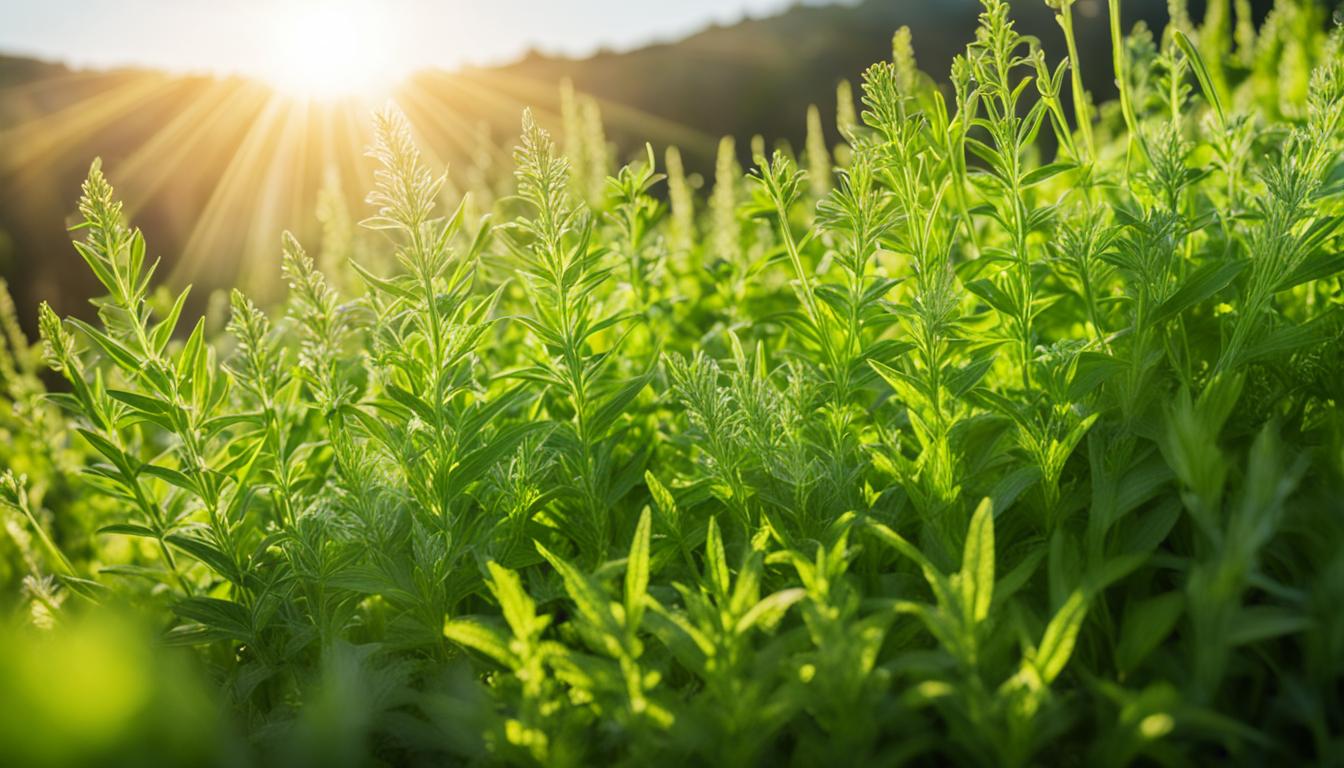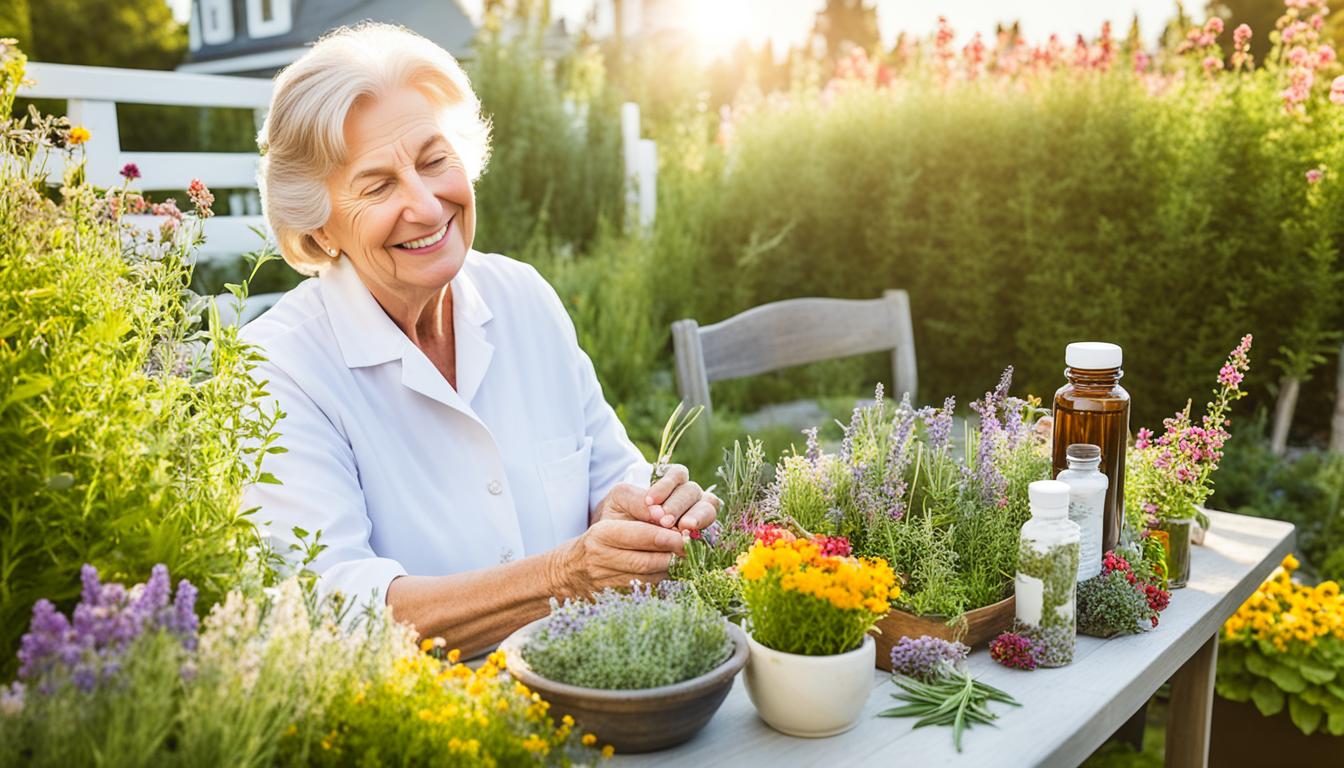Herbal remedies have been a key part of natural healing for centuries. They trace back to ancient civilizations like the Egyptians, Greeks, and Chinese. These cultures used plants for both food and medicine. Today, there’s a renewed interest in holistic healing that includes these traditional practices.
As you explore herbal remedies, you’ll see how plants rich in compounds like alkaloids and flavonoids can boost your health. These remedies can help with immune function and digestive health. Adding herbal solutions to your daily life could lead to better health.
Naturopathic doctors combine traditional plant therapies with modern methods. They create herbal treatments that meet specific health needs. By choosing high-quality, organic herbs from trusted sources, you enhance the effectiveness of these remedies. This approach supports your body’s natural healing abilities.
Key Takeaways
- Herbal remedies have been used for centuries for health and nutrition.
- Plants contain active compounds that make them healing.
- Naturopathic doctors tailor herbal treatments for different health issues.
- Using herbal teas daily can improve relaxation and digestion.
- Choosing high-quality herbs is key to getting the most health benefits.
Introduction to Herbal Remedies
Herbal remedies are a key part of alternative medicine, offering natural solutions for health issues. They come from plants and can be in forms like teas, capsules, tinctures, and extracts. It’s essential to know how these herbal medicines are made to use them safely in your health routine.
More people are turning to herbal remedies for a more personalized and natural health approach. However, it’s crucial to remember that these products don’t go through the same strict testing as traditional medicines. So, be cautious when choosing herbal options.
Some herbs, like St. John’s Wort, can help with mild to moderate depression but can also interact badly with certain medications. Kava, used for anxiety and sleep issues, can cause severe liver damage. Always talk to a healthcare professional about potential side effects and interactions with other drugs.
Adding herbal remedies to your life can be beneficial, especially for those looking for alternatives to traditional treatments. Always prioritize safety by talking to your healthcare provider before starting any herbal medicines, especially if you’re pregnant, breastfeeding, or having surgery. Look for products with reputable certifications like “USP Verified” to ensure their quality and purity.

Understanding Natural Healing and Alternative Medicine
In recent years, the interest in natural healing and alternative medicine has surged. Many individuals seek to restore balance in their lives. This approach focuses on treating the root causes of health issues, not just symptoms. By using herbal supplements and holistic techniques, many find a path to overall well-being.
Natural healing methods consider the physical, emotional, and spiritual aspects of health. Herbal medicine practitioners use plants with a long history of therapeutic use. The ancient Egyptians documented over 850 medicinal plants around 1550 BC, laying the groundwork for modern herbal practices.
Holistic doctors combine conventional treatments with natural remedies for individual needs. Naturopathic doctors may use herbal supplements for various health concerns, from chronic fatigue to menopausal symptoms. It’s crucial to understand that not every herbal treatment is suitable for everyone. Holistic medicine aims to cater to your unique health journey.
Healthcare providers in alternative medicine come from diverse backgrounds. They include medical doctors, chiropractors, and herbal specialists, each with their unique training. When considering natural healing options, it’s essential to choose a qualified practitioner. Evaluating their experience and specializations can lead to a more tailored treatment plan that aligns with your holistic health goals. For more insights on navigating your health alternatives, check out this link.
Exploring natural remedies can lead to a deeper understanding of your health and improved well-being. The body has an innate ability to heal. Natural healing principles can support this process effectively.
The Benefits of Herbal Remedies for Holistic Healing
Herbal remedies for holistic healing bring numerous advantages, enhancing your health and well-being. They have fewer side effects than traditional medications, which can cause issues like gastrointestinal problems, heart palpitations, or seizures. Their affordability makes them a viable alternative, given that about 66 percent of adults in the U.S. depend on prescription drugs.
Herbal products are increasingly popular for their support of natural wellness. For example, Echinacea supplements can reduce the risk of catching a cold and shorten its duration. This underscores their potential as a health aid! Integrating these options into your daily routine can lead to improved health. Ancient Bliss offers a variety of herbal supplements, ensuring quality and effectiveness through thorough testing.
Herbal remedies play a key role in holistic healing by tackling health issues like anxiety, inflammation, and immune support. Research suggests that Ginkgo can enhance memory and blood circulation, while St. John’s Wort may be a safer choice for mild-to-moderate depression. With around 80% of people globally using herbal medicines for health care, their effectiveness is clear.

Exploring the benefits of herbal remedies encourages a natural approach to health. These powerful plants can aid in your holistic healing journey, balancing your mind and body. With a rising interest in natural wellness, now is a great time to consider adding these remedies to your lifestyle.
Popular Herbal Products and Their Uses
In the realm of natural healing, popular herbal products have become increasingly prominent. They are sought after for their ability to support the immune system and reduce anxiety. This section delves into the most recognized herbal products and their specific uses. It aims to shed light on how these products can enhance your health.
Chamomile for Anxiety and Relaxation
Chamomile is celebrated for its calming effects, often consumed as tea to ease anxiety and foster relaxation. Many individuals enjoy chamomile tea before bed, which helps ensure a restful night’s sleep. Its soothing properties also make it effective for topical use, offering relief from skin irritations. Given its role as a natural anxiety reliever, it’s crucial to be aware of any potential interactions with other medications.
Echinacea for Immune Support
Echinacea is well-known for bolstering the immune system. It is commonly consumed during the cold and flu season to potentially strengthen the body’s defenses. Despite varying research outcomes, some studies indicate that short-term use may lower the risk of contracting a cold by 10-20%. Opting for high-quality Echinacea products is key to reaping its immune health benefits.
Ginger for Digestive Health
Ginger is highly valued for its digestive and anti-inflammatory attributes. It is effective in reducing nausea, benefiting those suffering from motion sickness, morning sickness during pregnancy, or chemotherapy-induced nausea. Ginger’s antioxidant properties also contribute to overall health, positioning it as a fundamental component in wellness routines. As the interest in herbal remedies grows, ginger remains a preferred choice for digestive health.
Herbal Remedies for Anxiety and Stress
Many individuals turn to natural solutions for anxiety and stress. Herbal remedies, particularly Valerian root and Lavender, have become popular for their calming effects. These options are known to offer relief and enhance relaxation.
Valerian Root as a Natural Sleep Aid
Valerian root has been a traditional remedy for centuries, addressing insomnia and anxiety. Research indicates it could be a potent natural sleep aid. Despite inconsistent results, some people experience better sleep quality with this herb. It comes in various forms, including capsules and teas, making it a viable option for improving sleep.
Lavender for Calming Effects
Lavender is renowned for its calming properties, making it a favored choice for anxiety relief. Its use in aromatherapy can reduce tension and foster relaxation. Studies suggest that compounds like linalool and linalyl acetate interact with brain receptors, boosting the herb’s effectiveness. While more research is needed, lavender in oil or tea form can create a tranquil atmosphere.
Herbal Remedies for Inflammation
Chronic inflammatory diseases are a significant global health concern. Exploring herbal remedies for inflammation can offer relief and improve well-being. This section focuses on two powerful herbs: turmeric and ginger. Both are renowned for their anti-inflammatory properties.
Turmeric’s Anti-Inflammatory Properties
Turmeric contains curcumin, a compound celebrated for its exceptional anti-inflammatory properties. Numerous studies highlight turmeric’s potential effectiveness in managing conditions such as arthritis and other inflammatory ailments. Incorporating turmeric into your diet, whether through cooking or as a supplement, may help mitigate the effects of chronic inflammation.
You may consider adding turmeric powder to smoothies or golden milk for a delicious way to reap its benefits. Always remember to consult with a healthcare professional regarding proper dosages to ensure safety and effectiveness.
Ginger’s Role in Reducing Inflammation
Ginger is not only well-known for its digestive benefits but is also effective in reducing inflammation. Research indicates that a daily intake of 1,000 to 3,000 mg of ginger can significantly lower inflammation markers in the body. You can incorporate ginger in various forms, such as fresh root, powder, or tea.
Adding grated ginger to your meals or enjoying a soothing ginger tea can promote overall health. As with turmeric, understanding the appropriate dosage and potential interactions with other medications is essential for maximizing the benefits of ginger.

Exploring herbal remedies for inflammation like turmeric and ginger not only provides natural solutions but also taps into age-old traditions for better health. Make a conscious effort to incorporate these herbs into your lifestyle to experience their potential benefits. For further information on health practices, consider exploring local culture and traditional.
Understanding Herbal Supplements: Safety and Quality
When exploring herbal supplements, it’s vital to grasp their safety and quality. These products, sourced from plants, exhibit significant variability in efficacy and safety. Many assume herbal supplements are inherently safe, but this assumption is not universally true. The FDA regulation on these items is less stringent than that for prescription drugs. Hence, manufacturers don’t need to demonstrate the safety or effectiveness of their products before selling them.
It may come as a shock to discover that some herbal supplements contain fillers or substandard ingredients. This can result in potential contamination and dosage inconsistencies. Choosing reputable brands can reduce these risks. Seek out products that offer transparency, such as third-party testing and certifications. Such diligence aids in selecting high-quality herbal supplements that meet your health objectives.
The increasing popularity of herbal remedies necessitates a deeper understanding of the products we consume. Certain herbal supplements, like garlic and echinacea, have been backed by research for their benefits. Yet, others lack robust scientific support for their claims. Consulting reliable sources and healthcare professionals can offer deeper insights into the safety and quality of herbal supplements.
Herbal Remedies for Immune System Support
Exploring herbal remedies for immune system support reveals a vast array of natural options. These options can significantly boost your body’s defense capabilities. Elderberry and garlic are two such allies, each with distinct properties that enhance overall health.
Elderberry for Cold and Flu Prevention
Elderberry is renowned for its antiviral properties, making it a top choice for preventing and treating colds and flu. It is loaded with antioxidants and vitamins, which support immune function and help ward off illness. Many turn to elderberry syrup or supplements to leverage its benefits.
Research indicates that elderberry’s active compounds can hinder viral replication. This offers an additional shield during the cold season. Adding elderberry to your wellness regimen can be both tasty and beneficial for maintaining health.
Garlic’s Immune-Boosting Benefits
Garlic, a common ingredient in global kitchens, offers more than just flavor. It is a potent herb that can significantly enhance your immune system, aiding in the fight against infections. Studies suggest that garlic can boost the body’s defense against pathogens through its antibacterial and antiviral properties.
Incorporating garlic into your diet can lead to improved health, particularly during the cold and flu season. You can enjoy it raw, cooked, or as a supplement to benefit from its health perks.

Herbal Remedies: Myths and Facts
Exploring myths about herbal remedies reveals why misconceptions endure. Many believe that herbs like valerian or chamomile cure insomnia. However, the scientific backing for their effectiveness is sparse. Similarly, passionflower is often touted as a stress reducer, but its benefits are not well-documented. This underscores the value of delving into facts on herbal medicine rather than just trusting hearsay.
Another widespread myth is that vitamin C supplements ward off colds universally. Yet, research suggests they might only help those under intense physical strain, like marathon runners. Garlic supplements are also believed to lower cholesterol, but the evidence is inconsistent across various studies. These findings highlight the importance of separating fact from fiction.
While turmeric, for instance, has shown anti-inflammatory effects, its role in preventing dementia is still uncertain. As research on new herbal remedies advances, it’s crucial to stay vigilant and demand thorough studies. It’s also vital to understand how herbs interact with conventional medicines, seeking advice from healthcare experts whenever possible.
Understanding the Importance of Consulting Healthcare Providers
Before starting with herbal remedies, consulting healthcare providers is crucial. It ensures you understand the potential effects of herbal supplements. Your medical team can provide vital information about their safety and interactions with other medications.
Studies reveal that many patients, especially Latinos, don’t inform their doctors about using traditional or alternative medicine. This silence can lead to risks, like interactions between herbs and prescription drugs, or missing important health concerns.

Patients often hesitate to discuss herbal supplements due to fear of judgment or believing their doctors won’t understand. However, sharing this information can strengthen your relationship with your healthcare provider. It opens a channel for better advice and support, ensuring your safety with herbal medicine.
Discussing herbal remedies with your healthcare provider is key to a collaborative health approach. They can offer insights and advice tailored to your specific situation. This collaboration leads to safer health outcomes and more informed choices.
Conclusion
As we conclude this exploration, it’s vital to acknowledge the *significant* role herbal remedies play in promoting natural wellness. The 152,000 accesses to research articles and their citations in academic literature highlight a growing interest in their potential benefits. This article encourages you to consider adding herbal remedies to your health routine. It advocates for a holistic approach that respects the intricate balance of your body’s needs.
Yet, it’s crucial to tread with caution. While 19% of respondents in the US have used herbal medicine in the past year, understanding these products is essential for safety and efficacy. Being aware of the increasing use of herbal remedies, driven by their perceived benefits over conventional treatments, aids in navigating this evolving landscape thoughtfully.
By staying informed and engaging with healthcare providers, you can fully benefit from herbal remedies. This approach enhances both your physical and emotional health. Remember, natural wellness is a journey that thrives on knowledge, safety, and mindful choices.
FAQ
What are herbal remedies?
How do herbal remedies support holistic healing?
Are herbal remedies safe to use?
Can herbal remedies help with anxiety?
What are some popular herbal products?
How do I know which herbal remedies to choose?
What should I consider when taking herbal supplements?
Are there any myths about herbal remedies?
How can herbal remedies support my immune system?
Why is it important to consult with healthcare providers before using herbal remedies?
Source Links
- An Introduction to Herbal Medicine – Pure | Elevate Your Health – https://purereddeer.com/herbal-medicine/
- Herbal Remedies for Sleep – https://www.hachettebookgroup.com/titles/maria-noel-groves/herbal-remedies-for-sleep/9781635867749/
- Herbal Remedies Audiobooks in Alternative & Complementary Medicine – https://www.audible.com/cat/Alternative-Complementary-Medicine/Herbal-Remedies-Audiobooks/18573396011
- A guide to herbal remedies: MedlinePlus Medical Encyclopedia – https://medlineplus.gov/ency/patientinstructions/000868.htm
- Introduction – Some Traditional Herbal Medicines, Some Mycotoxins, Naphthalene and Styrene – https://www.ncbi.nlm.nih.gov/books/NBK326625/
- Holistic Medicine: What It Is, Treatments, Philosophy, and More – https://www.webmd.com/balance/what-is-holistic-medicine
- Alternative Medicine – StatPearls – NCBI Bookshelf – https://www.ncbi.nlm.nih.gov/books/NBK538520/
- Herbal Medicine vs. Holistic Medicine, What’s the Difference? – Cutler Integrative Medicine – https://www.cutlerintegrativemedicine.com/blog/herbal-medicine-vs-holistic-medicine-whats-the-difference/
- What Are the Benefits of Herbal Medicine? – Ledger – https://campuspress.yale.edu/ledger/what-are-the-benefits-of-herbal-medicine/
- Herbal medicine Information | Mount Sinai – https://www.mountsinai.org/health-library/treatment/herbal-medicine
- Herbal Medicine – Herbal Medicine – https://www.ncbi.nlm.nih.gov/books/NBK92773/
- Herbal Medicine – https://www.hopkinsmedicine.org/health/wellness-and-prevention/herbal-medicine
- 9 Popular Herbal Medicines: Benefits and Uses – https://www.healthline.com/nutrition/herbal-medicine
- Herbs for anxiety: Does it work? Plus 9 calming options – https://www.medicalnewstoday.com/articles/herbs-for-anxiety
- Herbal treatment for anxiety: Is it effective? – https://www.mayoclinic.org/diseases-conditions/generalized-anxiety-disorder/expert-answers/herbal-treatment-for-anxiety/faq-20057945
- Natural remedies for inflammation: Foods, supplements, and more – https://www.medicalnewstoday.com/articles/natural-remedies-for-inflammation
- 9 Herbs and Spices That Fight Inflammation – https://www.healthline.com/nutrition/anti-inflammatory-herbs
- Herbal Supplements – StatPearls – NCBI Bookshelf – https://www.ncbi.nlm.nih.gov/books/NBK536964/
- What To Do Before Taking Herbal Supplements – https://health.clevelandclinic.org/herbal-supplements-use
- An Easy Bitters to Boost Your Immune System – https://www.healthline.com/health/food-nutrition/immune-system-bitters-recipe
- Opportunities for Health Promotion: Highlighting Herbs and Spices to Improve Immune Support and Well-being – https://www.ncbi.nlm.nih.gov/pmc/articles/PMC7815254/
- 11 Herbs You Need to Know for Immune Support – https://www.gaiaherbs.com/blogs/seeds-of-knowledge/11-herbs-you-need-to-know-for-immune-support
- Myth-Busting Popular Natural Products Marketed for Disease Prevention and Wellness – https://www.nccih.nih.gov/health/providers/digest/myth-busting-popular-natural-products-marketed-for-disease-prevention-and-wellness
- Common Myths About Herbal Medicine – Bloom Institute – https://bloominstitute.ca/common-myths-about-herbal-medicine/
- Myth Or Fact? Folklore And Home Remedies Tested – https://www.henryford.com/blog/2016/12/folklore-home-remedies-tested
- Disclosure of complementary medicine use to medical providers: a systematic review and meta-analysis – Scientific Reports – https://www.nature.com/articles/s41598-018-38279-8
- Physicians’ knowledge and communication about traditional, compleme… – https://journals.openedition.org/factsreports/3221
- Why people use herbal medicine: insights from a focus-group study in Germany – BMC Complementary Medicine and Therapies – https://bmccomplementmedtherapies.biomedcentral.com/articles/10.1186/s12906-018-2160-6
- The growing use of herbal medicines: issues relating to adverse reactions and challenges in monitoring safety – https://www.ncbi.nlm.nih.gov/pmc/articles/PMC3887317/
- Herbal medicine and cancer – https://www.cancerresearchuk.org/about-cancer/treatment/complementary-alternative-therapies/individual-therapies/herbal-medicine


